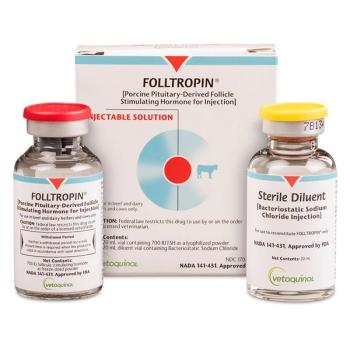
- dvm360 June 2022
- Volume 53
- Issue 6
- Pages: 82
Coenzyme Q10 use in pets
Your veterinarian just prescribed coenzyme Q10 (CoQ10) for your pet. How will it help?
The doctor has prescribed coenzyme Q10 (CoQ10 ) for your pet. CoQ10 is a popular and safe supplement that has been used for many years in people and animals. There are a number of uses in pets for CoQ10, and it is important to administer the supplement as prescribed.
CoQ10 is an antioxidant synthesized in most tissues in the body and found in all cells, with its highest concentration in the heart, kidneys, liver, and pancreas. The supplement is also found in foods including organ meats, poultry, fish, meat, nuts, soybean oil, canola oil, fruits, vegetables, dairy products, and eggs.
CoQ10 is useful for treating pets with a variety of medical problems and those needing antioxidant support. Pets with dental disease, especially those with gingivitis, may benefit from CoQ10 because of its ability to reduce gum inflammation. Pets with cardiovascular disease also may benefit because the supplement improves heart function, as may pets with cancer because it improves immune function. In particular, pets receiving the chemotherapy drug doxorubicin may benefit from CoQ10 usage as it may mitigate the heart toxicity that can occur during treatment with the cancer drug. CoQ10 is not as commonly used in pets as in people, but pets taking statin drugs to lower blood cholesterol or lipid levels should receive the supplement to prevent the adverse effects commonly seen with statins. Finally, CoQ10 in dogs and cats can also be used to reduce high blood pressure; as regular supplementation in older pets due to declining CoQ10 in aging patients; and in pets with any type of immune dysfunction, diabetes mellitus, hyperthyroidism and hypothyroidism, myasthenia gravis, and degenerative myelopathy.
CoQ10 supplementation is considered very safe in dogs and cats; absorption may improve when it is given with food, especially a fatty meal. The supplement can be given along with various medications the doctor may have prescribed for your pet. As always, though, it is important to let your doctor know of any adverse effects or dosage changes once your pet begins supplementation with CoQ10.
Because there is a wide variety of quality among CoQ10 supplements, clients should use only the product that has been prescribed, for best results. The supplement market is largely unregulated (unless adverse events are reported to the Food and Drug Administration or Department of Agriculture) and anyone can develop and sell supplements without any consideration for the effectiveness, safety, or quality of ingredients. Purchasing and administering supplements from unknown or disreputable manufacturers can be costly and may expose your pet to supplements that are ineffective or even harmful, especially if contaminated with other ingredients. Although we don’t expect adverse effects to occur, remember that any medication or supplement can cause adverse effects in an individual patient; however, these are much less likely to occur with supplements than with conventional medications.
Articles in this issue
over 3 years ago
Taking Pride in Yourself and Othersover 3 years ago
Where’s the money?over 3 years ago
“Hello, I Must Be Going”: Groucho joins the familyover 3 years ago
Advanced laser surgery, and digital cytology elevate pet careover 3 years ago
Iatrogenic hypothyroidism in catsover 3 years ago
Cultivating the colon: Probiotics and prebioticsover 3 years ago
Talking pride in the veterinary professionover 3 years ago
An overview of critical care fluid therapy typesNewsletter
From exam room tips to practice management insights, get trusted veterinary news delivered straight to your inbox—subscribe to dvm360.






